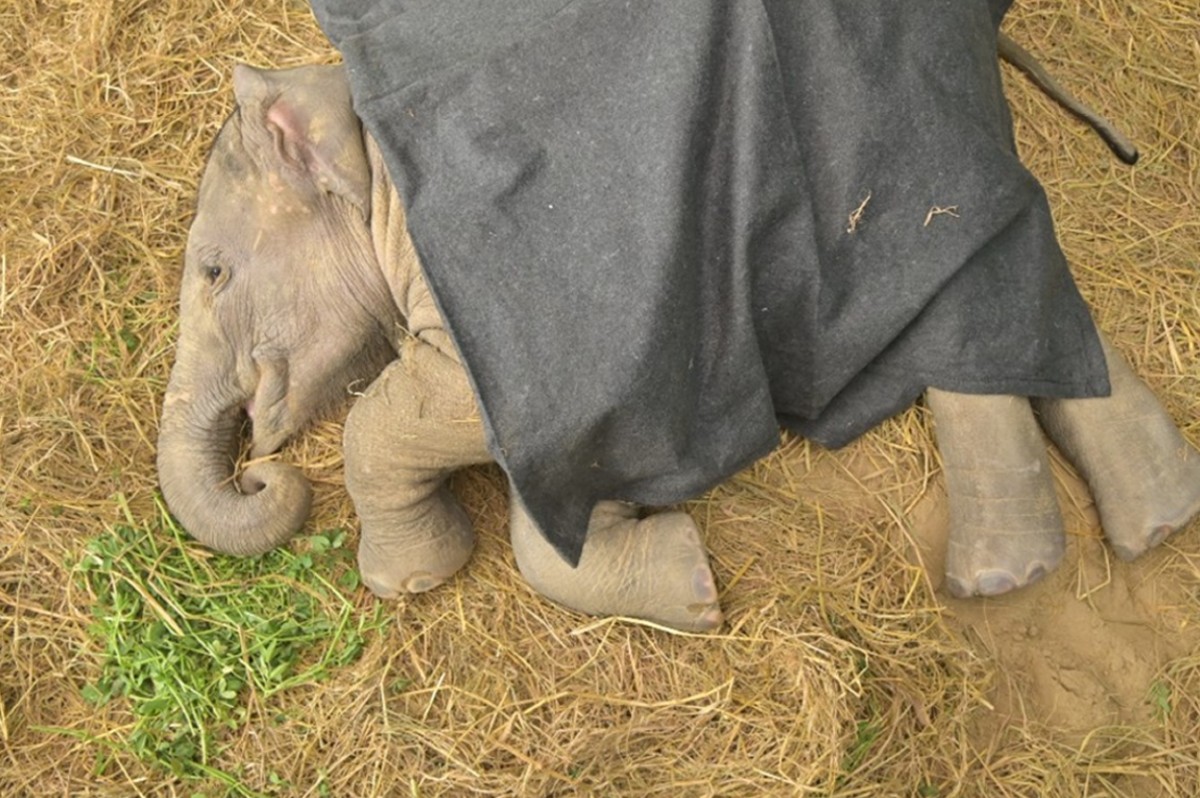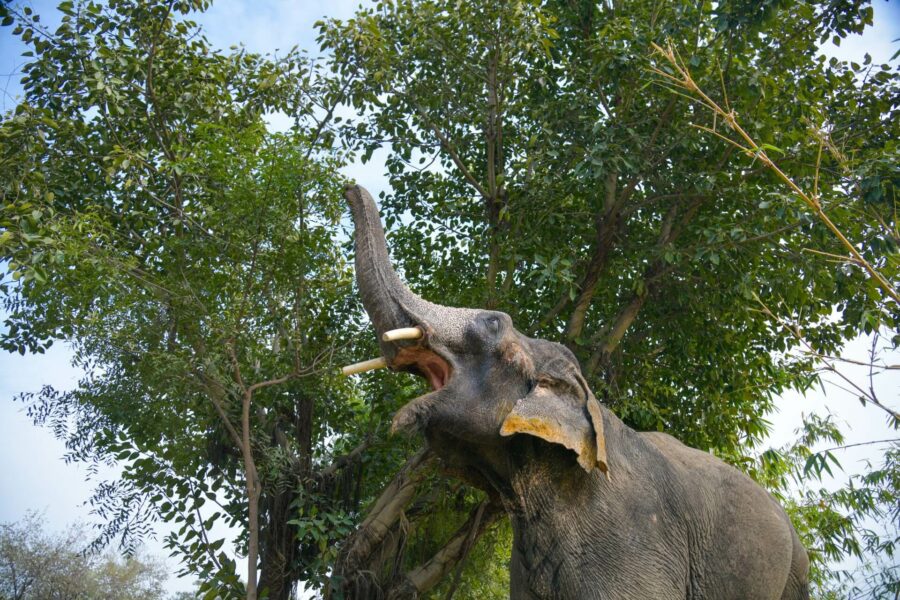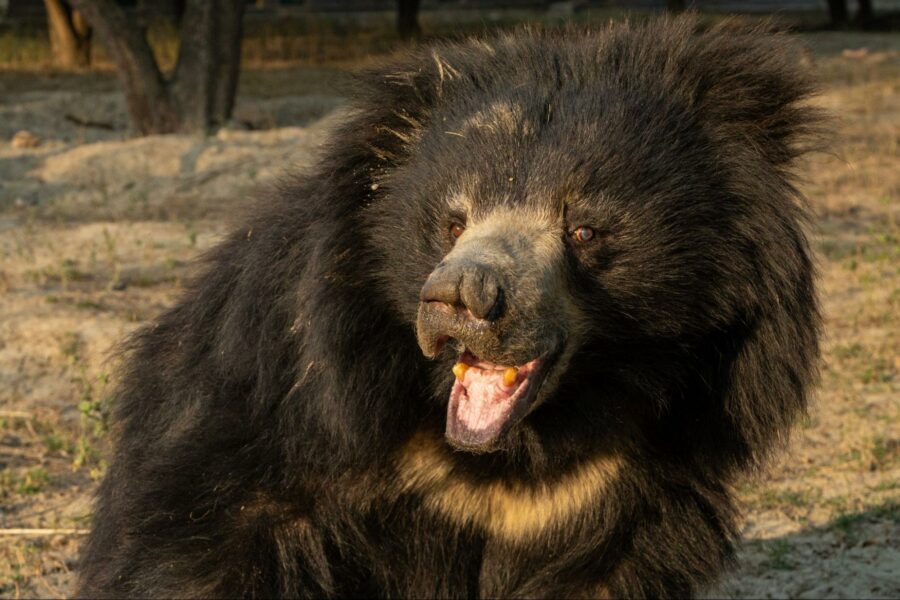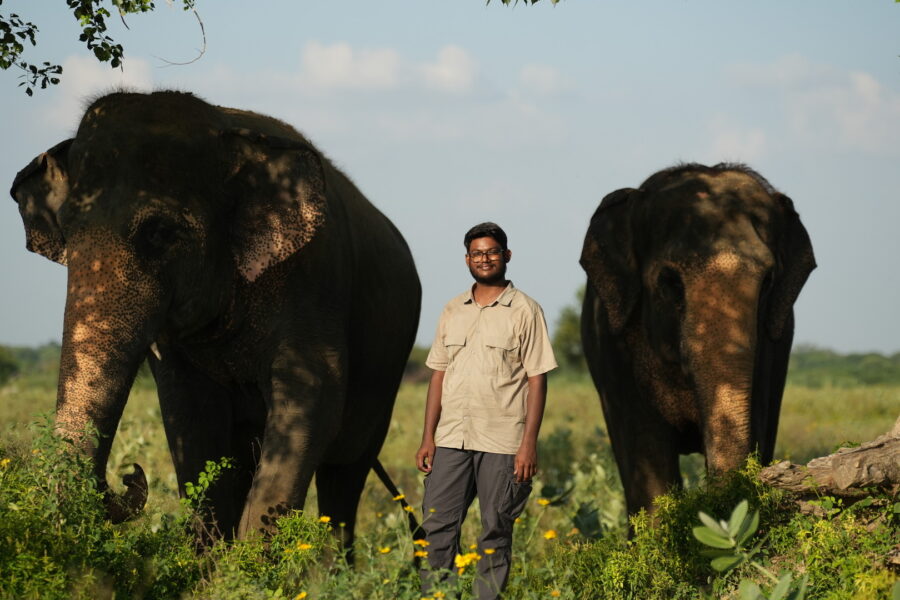In a horrifying, gruesome accident, a speeding train that runs through a recognised elephant crossing corridor near the Corbett National Park in Uttarakhand collided with a passing herd of elephants, resulting in the death of an adult female elephant and injuring a 9-month-old calf. The calf, likely thrown by impact, was discovered paralyzed in a field beside the tracks.
Left orphaned and abandoned by the panicked herd, the baby elephant faced significant injuries on her spine, hips, and legs, rendering her unable to stand. The Uttarakhand Forest Department officials along with veterinarians from Corbett National Park and Nainital Zoo provided the initial medical aid to the elephant calf. Veterinarians from Wildlife SOS were later called in to employ their expertise for the suffering infant.
This page will continue to update whenever there are new developments. Please scroll to the bottom to see the latest updates.
20 January 2024
The Wildlife SOS veterinary team has reached the location where the forest department had been caring for the baby elephant to evaluate her health. The first step was to collect information about how she was found by the forest department veterinarians.
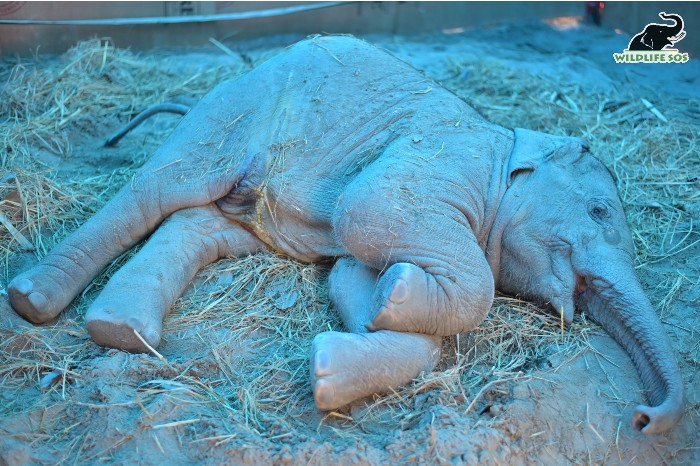
The calf had been found lying recumbent on her side, with numerous abrasion and open wounds on her body that were being treated. Her right hind limb showed no movement or sensation. The absence of tail movement was noted by the forest officials in the initial days, but the veterinarians from Wildlife SOS have observed a gradual return of the movement. Body functions, including feeding, defecation and urination, have been normal so far.
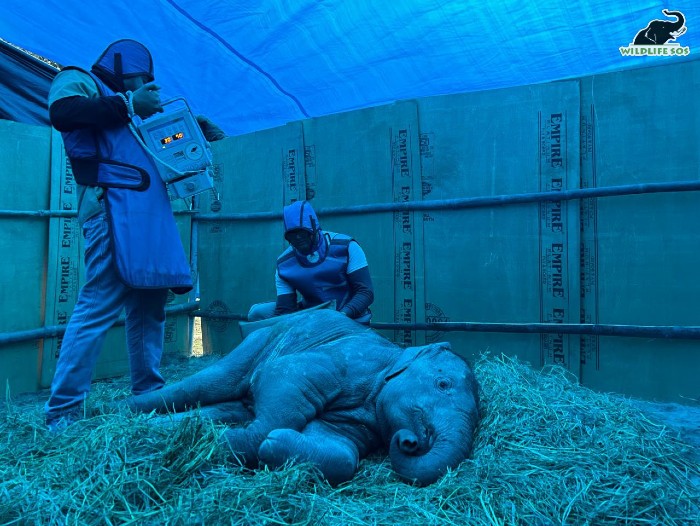
After recording these details, our team took X-rays of her limbs, spine, and hip girdle with the help of a portable X-ray machine to identify the cause behind her paralysis. Because the calf was in pain and night was setting in, thorough examinations have been postponed for the following day.
22 January 2024
Tests have been conducted on the elephant calf, and the results have revealed the following:
- X-rays show minor cracks in two vertebrae of the lumbar region, with no visible injury to her spinal column.
- Thermal imaging of her hip region indicates inflammation around her hip girdle and femur head, suggesting potential muscle damage or joint dislocation.
- Limitation of the portable field X-ray machine hindered proper consensus on what is wrong with her hip joint, and the reason behind her inability to stand. Therefore further examination is required.
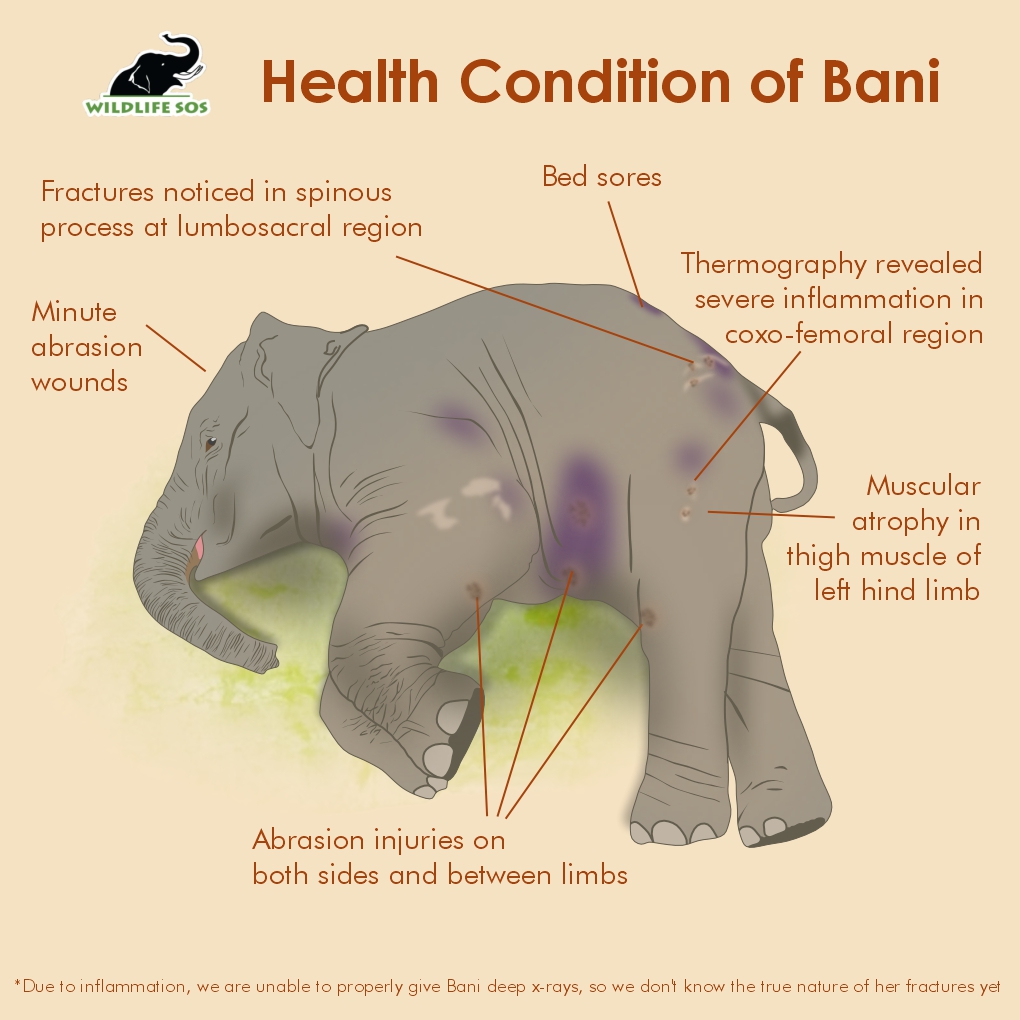
Prolonged periods of immobility pose risks by increasing intramuscular pressure, straining the young elephant’s heart, lungs, and blood circulation. Hence, our priority is to encourage her to stand ASAP. The following measures have been discussed and will be underway:
- Regular turning has been implemented to prevent bed sores.
- Regular cleaning and dressing of the abrasive wounds on her body
- Photobiomodulation therapy, employing laser and infrared light, along with therapeutic ultrasound, has been incorporated for expedited healing.
- Physiotherapy sessions — both manual and with the massage gun — using Ayurvedic oil, have been prescribed to stimulate muscle and joint movement.
- The treatment plan for the calf will be subject to continuous adjustments based on observations and responses.
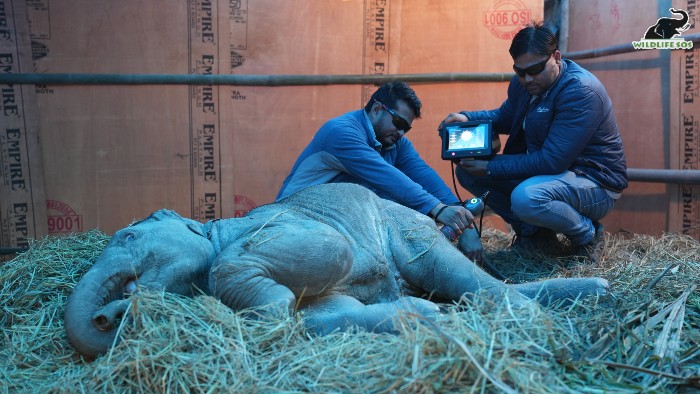
Supplementary Care:
- Essential supplements, including calcium and multivitamin tablets, are now incorporated into her diet to support bone health.
- Neurotonics have been administered for neural health.
- Liver tonics, calcium, vitamin, mineral and probiotics supplements have been prescribed for overall well-being.
Modified Dietary Chart:
- The calf is now receiving around 5 litres of a specialised milk mixture combined with porridge made from broken wheat and mung bean.
- Soft components of seasonal fodder, such as sugarcane and berseem, have been added.
- The 9-month-old infant has been introduced to a variety of seasonal fruits, with bananas emerging as her favourite.
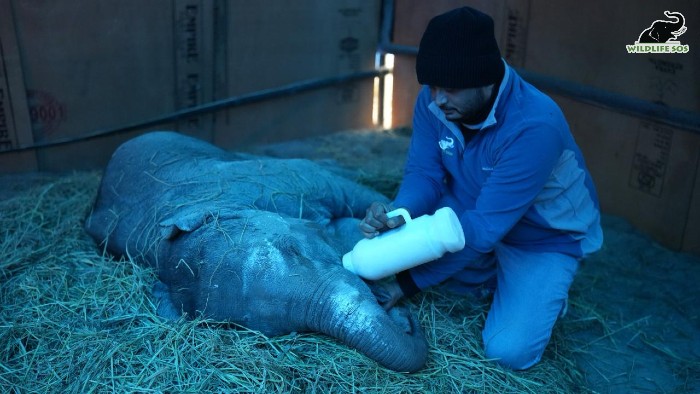
3 February 2024: The Journey to EHC Begins!
Following 14 days of on-site treatment, the decision to transfer the calf to the Elephant Hospital (EHC) in Mathura for specialised and urgent critical care has been taken. Necessary permissions from the Principal Chief Conservator of Forests and the Chief Wildlife Warden of the states of Uttarakhand and Uttar Pradesh have been obtained, and preparations for the journey were made to safely transport the baby elephant. The calf is now affectionately named Bani, after Mother Earth.
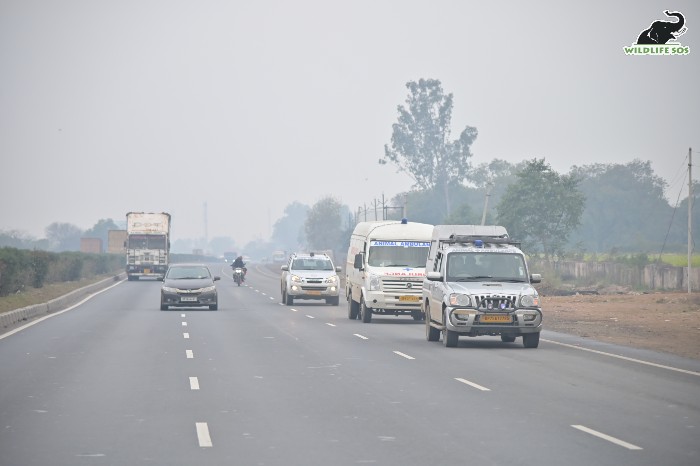
In preparation for her journey to us, our team in Mathura meticulously prepared the ambulance, prioritising every aspect of her well-being. The vehicle was layered with soft hay for cushioning and a cosy resting spot during the journey. Blankets ensured warmth, while hay-stuffed gunny sacks served as comfortable pillows for her legs. Treats, including sugarcane leaves, bananas, and papayas, were included. Water bottles and milk bottles were also provided to ensure that she stayed fed and hydrated throughout the journey.
Bani was initially apprehensive and highly alert, but she gradually settled down in the ambulance. The soothing touch of the veterinarians and caregivers contributed to calming her down. Offering her bananas, her favourite treat, proved to be a comforting factor during the trip. She showed limited interest in her fodder, but enjoyed munching on a few tender sugarcane leaves. Throughout the journey, Bani primarily consumed water and her milk mixture.
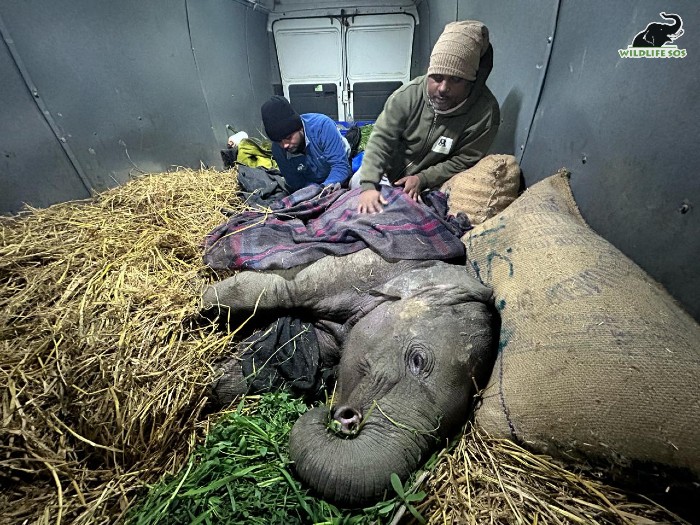
4 February 2024
Bani was fatigued when she arrived at EHC early this morning, but our staff is overjoyed to have her with us. For the time being, Bani is housed in a temporary enclosure constructed in front of the hospital, where she is undergoing various health checks.
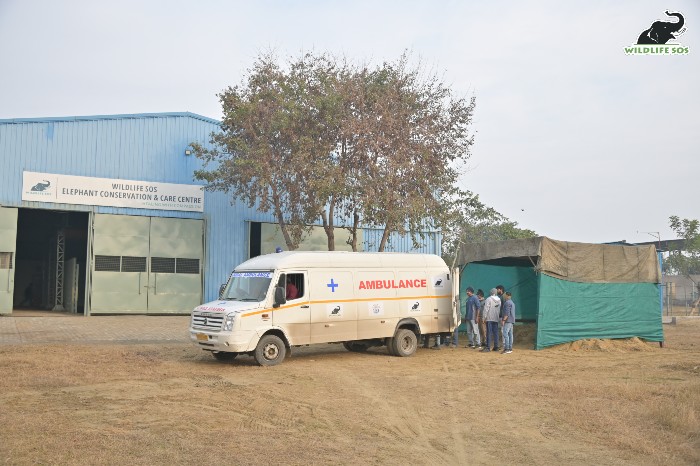
She is experiencing bloating, a common consequence of travel. Our veterinary team has initiated a course of probiotics and anti-bloating medication to address this issue. Additionally, Bani is encountering challenges in fully emptying her bladder, and veterinarians are assisting her manually by lifting her hind limbs and providing massages. After each attempt, she undergoes thorough cleaning, and her wounds are dressed to prevent infection.

Bani is left to rest while her veterinarians formulate a plan for her further course of treatment. Photobiomodulation therapy and physiotherapy continues.
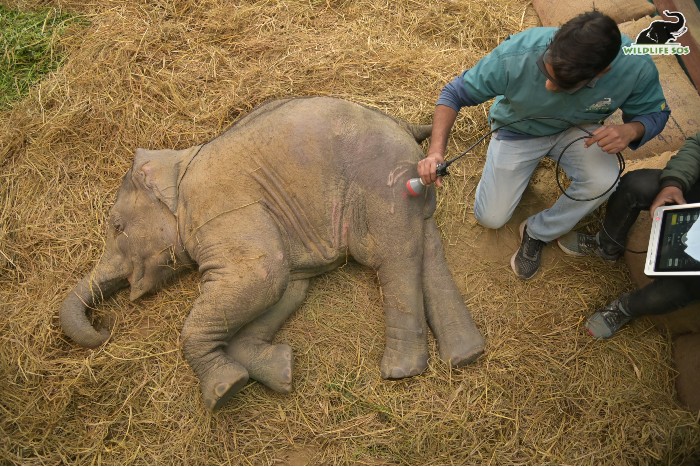
8 February 2024
Adjusting to a new environment is a challenge for any elephant, especially if it is an orphan. Despite the fresh wounds on her body, Bani shows strength and bravery by responding to our treatment efforts. Our veterinarians are trying to devise ways to provide her some comfort despite her abrasive wounds. Only once they are healed can our team proceed with her treatment in the hydrotherapy pool at EHC using a sling for support. The team is also using soft cushions to provide her relief from the aching wounds between her legs.
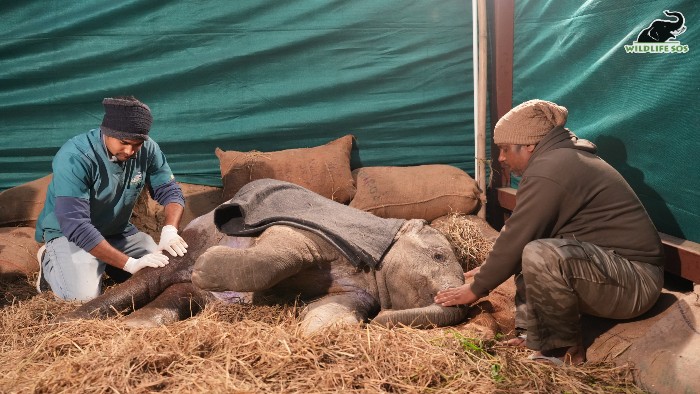
Her condition, although stable, is highly critical, as she has limited mobility that is affecting her organs. She presently has visible wounds on her body that are regularly being treated with medications. She is also being given laser therapy for joint pain and Trans-Cutaneous Electrical Nerve Stimulation (TENS) therapy for the nerves.
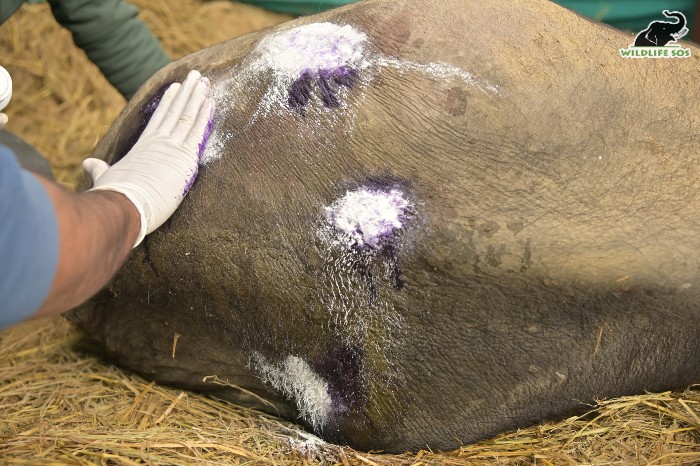
Wildlife SOS Co-founders Comforts Bani
Kartick Satyanarayan and Geeta Seshamani, our co-founders, have been integral to Bani’s journey from the start. They are entirely focused on her well being and are spending valuable time by her side. They engaged in meaningful discussions with the veterinarians, and actively contributed to refining and enhancing Bani’s treatment plan.
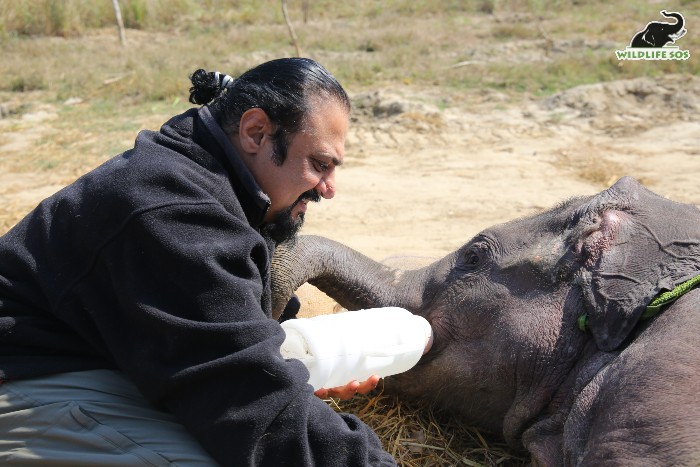
Furthermore, they discussed the upcoming construction of a new special nursery enclosure for Bani, located in the Elephant Hospital Campus. Reviewing the construction plans, they inquired with the team about any specific requirements or needs to ensure that Bani receives the best possible care.
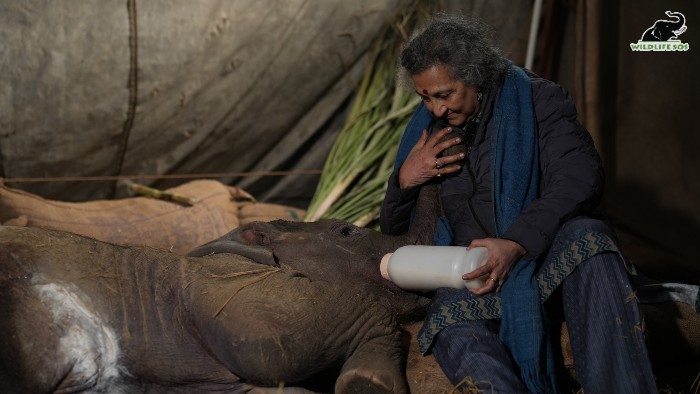
10 February 2024
After consulting with both foreign and resident expert doctors, as well as orthopedists, and reviewing multiple X-rays taken over time, our veterinarians have deduced that Bani is suffering from a neurological condition called spastic paraparesis.
To obtain precise X-rays of Bani’s limbs and hip joint, a crane-assisted sling was used to lift her into a standing position. Initially apprehensive, Bani was swiftly maneuvered through the procedure, ensuring minimal distress, and promptly returned to a comfortable lying position.
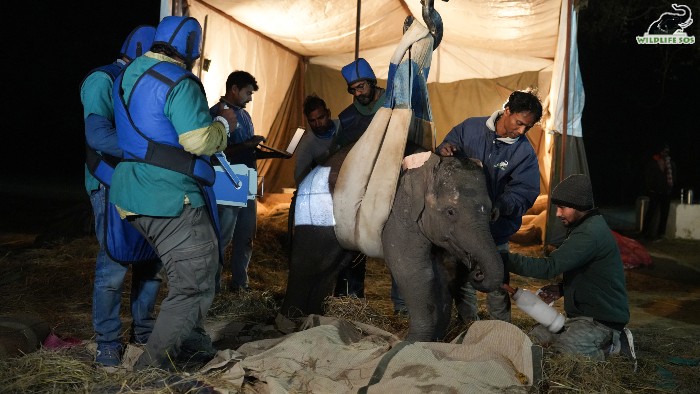
The treatment plan remains consistent with what we have so far been following, with the addition of a course of fluid therapy that consists of intravenous administration of neural supplements. Having consulted skilled ayurvedic practitioners, Bani is also receiving regular massages with a blend of ayurvedic oils.
Discussions are also underway to gradually lift Bani for longer periods of time using the crane-assisted sling, enabling her to alleviate pressure on her sides and slowly exercise her legs. Additionally, plans are in progress to introduce Bani to the hydrotherapy pool as soon as she shows signs of improvement.
12 February 2024
While Bani’s condition continues to be critical, she is slowly showing signs of improvement. Regular physiotherapeutic massages, incorporating Ayurvedic oils, specifically target her hind limbs as part of her ongoing treatment. Since winter chill continues, Bani’s veterinarians and caregivers make sure to conduct her sessions outdoors in the sun. This allows her to bask in the sunlight, providing warmth and relaxation during these therapeutic sessions.
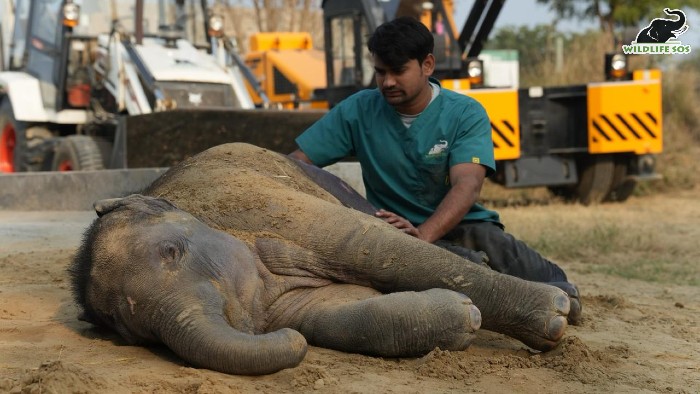
Her veterinarians are using a combination of manual techniques, gently folding and extending her legs to promote muscle and joint movement and a massage gun to soften her muscles. Although her hind limbs have not yet displayed the ability to bear weight and move, there is a significant reduction in muscle rigidity.
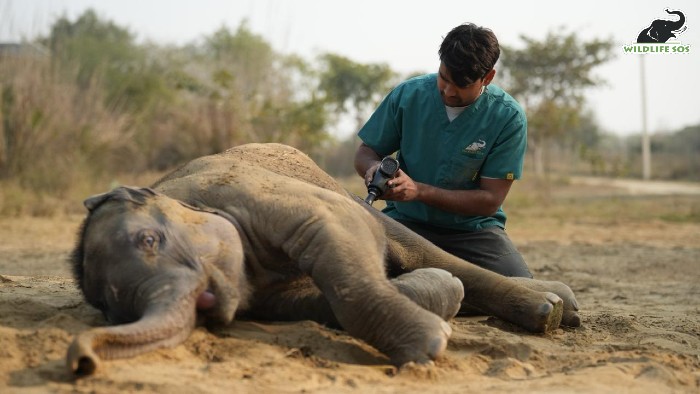
13 February 2024
We are thrilled to tell you that we’ve got Bani standing with assistance! She’s unsteady and can’t bear significant weight on her hind legs, but Bani is as excited as we are that she’s up! With a soft harness to support her, Bani managed to stand for 4 minutes on her first try.
But with round the clock care, treatment and support she’s receiving, Bani could stand up for about 40 minutes with the same assistance, after which she was given ample time to rest. This is a big milestone for the little elephant!
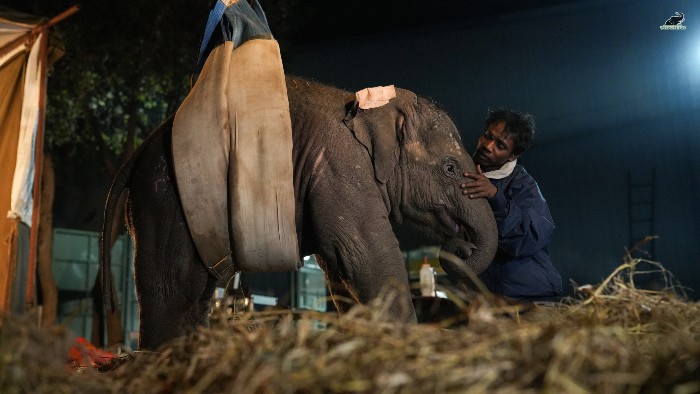
Bani has only been at our Elephant Hospital for 9 days now, but she is responding to treatment and showing us her determination to live. We have been worried because she has been on her side for weeks, and this has been very hard on her essential organs and blood circulation. Our caregivers have been working tirelessly on her hind legs in hopes of improving her movement and getting her to stand.
A New Nursery for Bani
Planning and construction for Bani’s new nursery enclosure are underway, with the selected area located right beside the Elephant Hospital. Groundbreaking has commenced, and the design involves creating a well-ventilated nursery with a spacious shed featuring a high roof and soft, elevated mud floors. These floors will later be generously covered with hay for added comfort and warmth. Discussions are also in progress to determine how to maintain her enclosure for comfort during changing seasons.
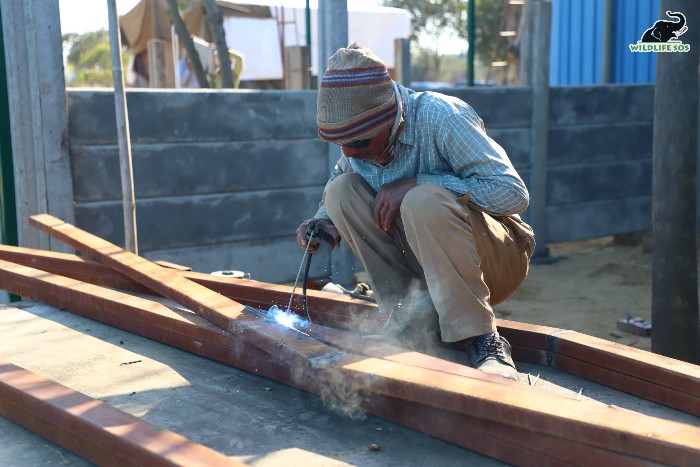
Bani’s Antics
Bani is responding positively to our various treatment plans and is also showcasing her playful and mischievous sides. She enjoys lounging in the warm embrace of the winter sun, indulging in a relaxing dust bath. Bani is also becoming more dexterous with her trunk, slowly learning to use it skillfully and independently grabbing onto items.
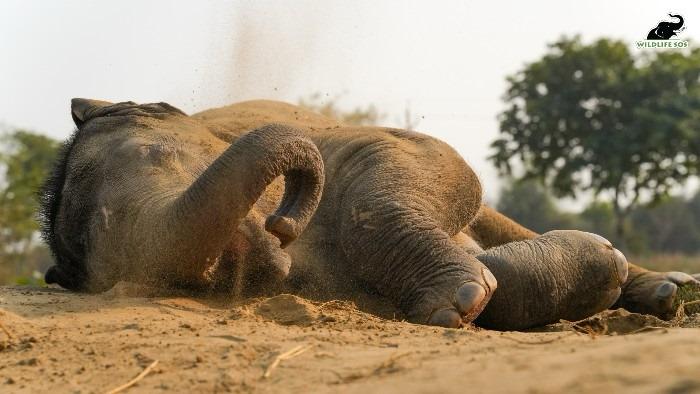
Additionally, she has demonstrated her preference of holding her milk bottle with her trunk — the milk bottle was earlier held by hand for her to feed on. Although her path to recovery is long and strenuous, the determination and strength displayed by this little elephant are truly inspiring.
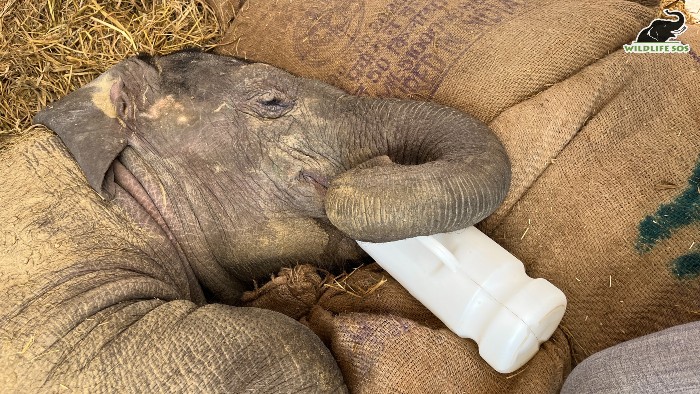
Bani receives continuous care and treatment, with a dedicated caregiver and veterinarian by her side every moment of the day. Even during the night, a committed team ensures her well-being while she rests.

19 February 2024
Bani underwent another attempt at being lifted with a sling, which lasted for 30 minutes!
While she was hoisted up, she kept trying to walk forward. Her hind legs would drag and cause her to lose balance, but each time, she would not give up trying. At this tender age, Bani inspires us all with her bravery.
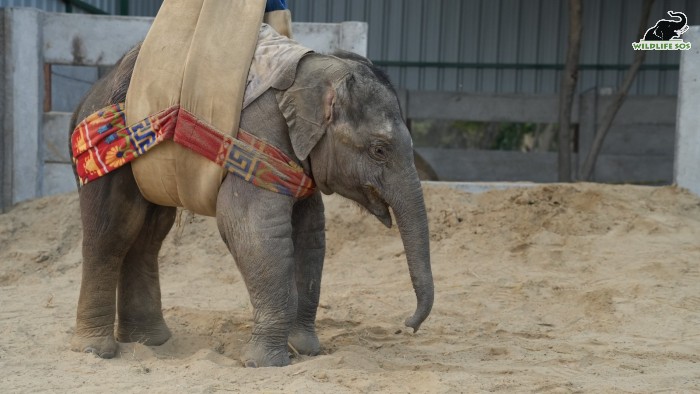
Notably, there has been a glimmer of progress in Bani’s condition, with our veterinarians observing a reduction in the stiffness of her muscles. This positive development brings a collective sigh of relief to our team, bolstering our resolve to continue her treatment with utmost care and attention.
Each day brings new learnings and observations, prompting adjustments to Bani’s therapy as we strive to provide her with the utmost comfort and support. To all who have generously contributed, whether through donations, petition signatures, or simply by spreading awareness, we thank you. Your ongoing support is invaluable to us.
Bani tries Hydrotherapy
As Bani’s balance improves with each session on the sling and her determination to walk grows stronger, her veterinarians have decided to gradually introduce her to the hydrotherapy pool. Given the transitional weather in Mathura, these sessions are scheduled on warm, sunny days to ensure Bani’s comfort both in and out of the water.
Hydrotherapy serves as a supplementary treatment, providing Bani relief from physical discomfort and gently initiating her muscle movement. During these sessions, Bani enters the partially filled pool with a team of veterinarians and caregivers that provide support for her hindlimbs and help steady her whenever she loses her balance. The water’s buoyancy alleviates stress on Bani’s feet and joints as she carefully wades through it, and this way, she is safely practising walking again. A standby crane, equipped with a sling, remains ready if needed.
She shows promising signs by slowly moving forward with her front legs, with assistance to balance her hind legs when in the water. The session is quite arduous for her and is therefore scheduled to be done every alternate day, weather permitting, to give her ample time to rest. Despite these challenges, Bani’s willingness to participate reflects the strength of her spirit.
6 March 2024
Bani’s daily ayurvedic oil massages continue to be a crucial part of her treatment regimen. To make sure that the most effective techniques are used, our team sought the expertise of a skilled Panchakarma Ayurvedic practitioner, who travelled from Kerala to Mathura to impart his knowledge to our veterinarians and caregivers. Bani receives two of these massages each day, aimed at warming her muscles and keeping them active to prevent atrophy. These massages can also maintain flexibility in her legs for walking attempts.
During these sessions, her hindlimbs are carefully manoeuvred and stretched to exercise the muscles. Additionally, a massage gun is employed to stimulate and provide relief to her muscles. Since the implementation of this process, the rigidity of her muscles has decreased, making them more pliable and responsive.
How can you help
Elephant fatalities due to railway accidents remain distressingly prevalent in India. While railway tracks are intended to connect human communities, they slice through the wild territories and migratory routes of elephant herds. The consequence: a collision course that results in the loss of elephant lives.
Ironically, the mascot of Indian Railways is an elephant, symbolising safety and reliability. However, every year, an average of 20 elephants are killed in train accidents, as per data released by the government. A majority of these collisions take place at night, when the elephant herds, preferring to rest during the day, are on the move.
Several measures can be strictly taken up and followed to prevent tragic outcomes. Bani is an infant elephant fighting for her life. Her condition, and the risks faced by elephants, demand immediate attention. Add your voice to this concern by signing and sharing Wildlife SOS’s petition.
Alternatively, consider contributing to her well-being:
- $25 for one bottle of specially formulated milk
- $50 for one dedicated caregiver for a day
- $100 to support a team in helping Bani stand
- $250 for two massage therapy sessions per week
- $500 for daily physical therapy sessions per week
- $1,000 for veterinary care and medicine for a week

